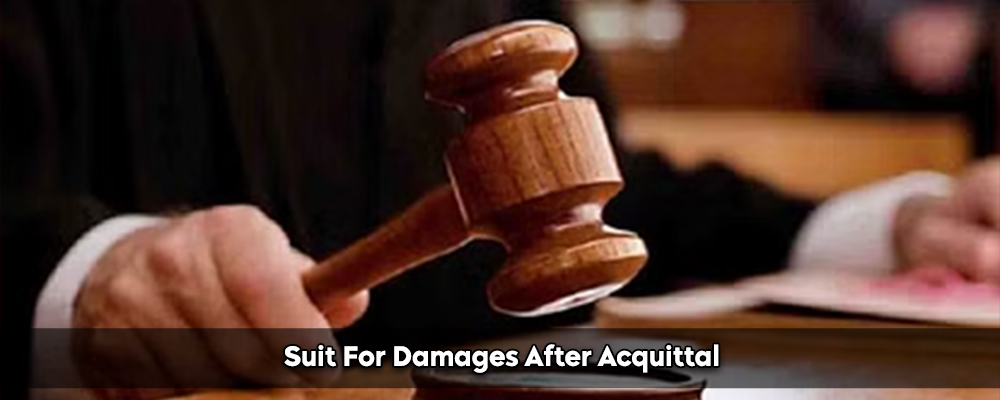Within the field of criminal justice, an individual’s acquittal signifies the end of a court case and a verdict that the defendant is not guilty of the allegations that were made against them. Although the acquittal is a source of joy and comfort, the experience might not necessarily come to an end as a result.
In certain situations, the unfairly accused person may think about filing a lawsuit to recover damages for any loss they suffered throughout the judicial procedure.
Need A Legal Advice
The internet is not a lawyer and neither are you. Talk to a real lawyer about your legal issue

Presumption of Innocence and Its Limits
- Central to any criminal justice system is the presumption of innocence until proven guilty. An acquittal reinforces the idea that the accused should be treated as if they had never been charged in the first place.
- However, the presumption of innocence does not automatically translate into an entitlement to compensation for damages suffered during the legal proceedings.
Burden of Proof in Civil Suits
- To succeed in a suit for damages after acquittal, the wrongly accused must typically transition from the criminal court, where the burden of proof rests with the prosecution, to the civil court, where the burden shifts to the plaintiff.
- In other words, the acquitted individual must prove not only their innocence but also that they suffered harm as a direct result of the legal proceedings.
Grounds for Seeking Damages
- Various grounds may form the basis for seeking damages after acquittal. Wrongful arrest, malicious prosecution, and defamation are common elements in such cases. A wrongful arrest occurs when law enforcement lacks probable cause for the arrest, leading to the detention of an innocent person.
- Malicious prosecution involves the intentional and wrongful initiation of criminal proceedings without probable cause. Defamation may arise if false and damaging statements are made during the legal process, tarnishing the accused’s reputation.
Proving Malicious Intent
- Establishing malicious intent is a formidable challenge in seeking damages after acquittal. Courts often require the wrongly accused to demonstrate that the prosecution acted with malice, meaning they intentionally pursued the case with the knowledge of its lack of merit.
- Proving malice may involve presenting evidence of fabricated or withheld evidence, witness coercion, or other forms of prosecutorial misconduct.
Role of Qualified Immunity
- In cases where law enforcement officers are involved, the concept of qualified immunity can complicate matters. Qualified immunity shields government officials, including law enforcement officers, from personal liability as long as their actions do not violate clearly established constitutional rights.
- Overcoming qualified immunity requires showing that the officers violated a clearly established right and that their actions were objectively unreasonable.
Challenges in Quantifying Damages
- Even when the wrongly accused successfully establishes a legal basis for seeking damages, quantifying the harm suffered poses another significant challenge. The legal system often requires a tangible demonstration of the economic, emotional, or reputational damage endured.
- This may involve presenting evidence of lost income, medical expenses, psychological trauma, or harm to one’s professional reputation.
Statutory Limitations and Immunities
- Jurisdictions vary in their approach to suits for damages after acquittal. Some jurisdictions have specific statutes outlining the conditions under which individuals can seek compensation, while others rely on common law principles.
- Additionally, certain immunities may shield public officials, such as prosecutors and law enforcement officers, from personal liability, further complicating the pursuit of damages.
Preventing Abuse of the Legal System
- While the pursuit of damages after acquittal is essential for those who have suffered unjustly, legal systems must strike a balance to prevent the abuse of the process.
- Frivolous lawsuits can burden the courts, waste resources, and potentially deter law enforcement and prosecutors from fulfilling their roles. Striking this balance requires careful consideration of the merits of each case and ensuring that the pursuit of damages is genuinely rooted in injustice.
Seeking damages after acquittal is a complex and challenging endeavour that requires navigating the intricate intersection of criminal and civil law. While the presumption of innocence is a foundational principle, successfully pursuing compensation for the harm endured during legal proceedings involves overcoming various legal hurdles. From proving malicious intent to quantifying damages and navigating statutory limitations, those who embark on this path face a demanding journey.
As the legal landscape evolves, finding a balance between protecting the wrongly accused and preventing abuse of the legal system remains crucial in fostering a just and equitable society.
One can talk to lawyers from Lead India for any kind of legal support. In India, free legal advice online can be obtained at Lead India. Along with receiving free legal advice online, one can also ask questions to the experts online free through Lead India.





 Talk to a Lawyer
Talk to a Lawyer